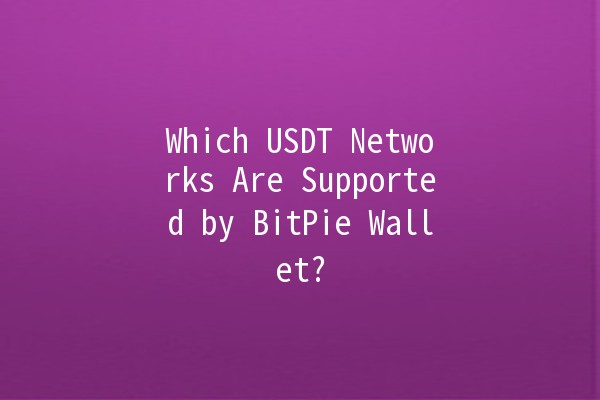




In the crypto world, wallets play a critical role in managing digital assets and facilitating transactions. One popular wallet that has drawn significant attention is the BitPie Wallet. Users often ask, "Which USDT networks are supported by BitPie?" To provide clarity, let's delve into the details, configurations, and practical applications of using USDT on different networks with BitPie Wallet.
USDT, or Tether, is a stablecoin pegged to the US dollar, meaning its value is stable relative to fiat currencies. This stability provides an excellent medium for conducting transactions, trading, and storing value in the volatile cryptocurrency market. As a widely used stablecoin, understanding the networks it operates on can help users choose the best wallet options to enhance their trading experience.
BitPie Wallet stands out for its versatility in supporting various blockchain networks for USDT transactions. As of the current date, BitPie Wallet supports the following USDT networks:

Description: The Ethereum network uses the ERC20 standard for USDT, allowing seamless integration with numerous decentralized applications (dApps) and decentralized finance (DeFi) protocols.
Advantages: Ethereum’s large ecosystem means users benefit from high liquidity and a wide range of services, such as lending, borrowing, and staking.
Practical Application: If you want to engage in DeFi activities, using USDT on the Ethereum network via BitPie Wallet is more efficient due to ERC20 compatibility.
Description: The Tron network employs the TRC20 standard for USDT, which ensures fast transaction speeds and lower fees compared to Ethereum.
Advantages: Tron is known for its scalability and can handle a high number of transactions per second, making it a favorite among traders seeking efficiency.
Practical Application: If you're looking to transfer USDT quickly with minimal fees, utilizing the TRC20 option in BitPie Wallet can significantly enhance your trading experience.
Description: The Omni Layer operates on the Bitcoin blockchain, making USDT available for trading using Bitcoin’s security and stability.
Advantages: Although it has slower transaction speeds compared to ERC20 and TRC20, it leverages Bitcoin's robust security model.
Practical Application: Users who prefer to hold Bitcoin but still want the stability of USDT can do so through the Omni Layer available in BitPie Wallet.
Description: EOS is another blockchain platform that allows USDT transactions. BitPie Wallet supports USDT via the EOS network, known for its high performance and low latency.
Advantages: EOS boasts a significant throughput and no transaction fees for users, making it appealing for frequent transactions.
Practical Application: Users running on decentralized applications within the EOS ecosystem can benefit from using USDT for transactions or investments.
Description: The Algorand network provides a platform for USDT that focuses on high speed and low transaction costs, appealing to various users in the crypto space.
Advantages: Algorand’s consensus mechanism enables immediate transaction finality, making it advantageous for active traders.
Practical Application: BitPie Wallet users looking for an efficient way to transact while using USDT should consider the Algorand network for quick trades.
Description: BSC is another popular network that supports USDT transactions, known for its compatibility with Ethereum tools and dApps.
Advantages: BSC typically offers lower fees and faster confirmation times, which is appealing for users looking at constant trading opportunities.
Practical Application: Those leveraging decentralized exchanges (DEX) can utilize USDT on BSC in BitPie Wallet to maximize costeffectiveness.
When using BitPie to manage USDT across various networks, you can enhance your productivity and ensure a seamless experience in the cryptocurrency landscape. Here are five proven techniques:
Explanation: Leverage the multinetwork capabilities of BitPie Wallet by conducting transactions on the most efficient network depending on your goals (speed vs. fee)
Example: If you need to transfer USDT for trading, opt for TRC20 for lower fees and faster transactions.
Explanation: Integrate price alert features within the wallet or through a mobile app to stay updated on USDT price movements.
Example: Set an alert for significant price changes that could impact your trading decisions and act promptly.
Explanation: Ensure that you regularly backup your BitPie Wallet to secure your assets and transaction history.
Example: Use cloud storage or encrypted USB drives to save your wallet data and recovery phrases securely.
Explanation: Keep yourself updated on the landscapes of the networks you are using for any planned upgrades or changes.
Example: Follow crypto news sites to gain insights into potential changes in ERC20 or TRC20 that could affect transaction speeds or fees.
Explanation: Investigate if there are staking options available for USDT on the network you choose, allowing your assets to generate passive income.
Example: Use USDT held on a DeFi platform within your wallet to participate in liquidity pools or earn yields.
Yes, BitPie Wallet allows users to switch between networks easily. The user interface is designed to facilitate quick changes, making it convenient for users to select their preferred USDT network based on transaction needs.
No, transaction fees vary by network. Generally, using the Ethereum network may have higher fees due to network congestion, while TRC20 transactions are typically cheaper. Always check the current fee rates before conducting a transaction.
BitPie Wallet employs industrystandard security measures, including encryption and twofactor authentication (2FA), to protect your funds. Additionally, always ensure your wallet is backed up for recovery purposes.
Yes, you can interact with various dApps through BitPie Wallet that support different USDT networks, especially on Ethereum and BSC, where dApps are more prevalent.
In case you lose access, use your backup recovery phrase to restore your wallet. Ensure that you store this phrase securely and never share it with anyone.
BitPie Wallet is specifically designed to accommodate USDT across various networks, including ERC20, TRC20, Omni, EOS, Algorand, and BSC. However, ensure you are using the correct network wallet for your tokens to avoid loss.
Understanding the supported USDT networks in BitPie Wallet and utilizing these productivityenhancing techniques can significantly improve your crypto management experience. Always remain vigilant and informed to navigate the everevolving crypto ecosystem effectively.